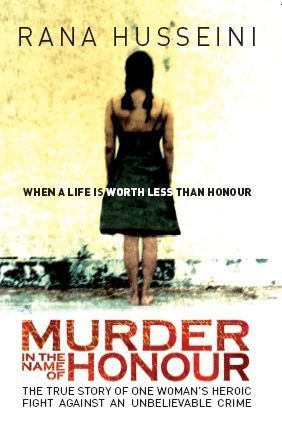“Jordan Farmer Kills Sister Over Alleged Affair,” read a recent headline from the Agence France-Presse. The 24-year-old man stabbed his sister after he became suspicious that she was having an affair. This is an “honor killing.”
That this story became news is partly the accomplishment of an award-winning Jordanian journalist who broke the silence about honor killings with her reports for the Jordan Times.
 “The most surprising thing to me is how a person can kill a close relative,” Rana Husseini told WIDE ANGLE. She chronicles 15 years of her reporting and the resulting push for social and legal reform in Jordan in her new book, “Murder in the Name of Honor.”
“The most surprising thing to me is how a person can kill a close relative,” Rana Husseini told WIDE ANGLE. She chronicles 15 years of her reporting and the resulting push for social and legal reform in Jordan in her new book, “Murder in the Name of Honor.”
Honor killings are relatively rare – numbering about 25 a year in Jordan, and about 5,000 a year worldwide (13 women a day). But the crime is one of the most brutal practices in the modern world. It occurs when a family feels its female relative has tarnished its reputation by her “immoral behavior” – which can range from being raped to having an unrecognized phone number on her cell phone – and is often carried out by the woman’s brother or father.
Husseini’s effort to report on the crime met resistance in Jordan when critics accused her of hurting the country’s reputation and of trying to devalue its culture by imposing Western values.
“I’ve been accused of being a Western agent,” said Husseini. “Its unfortunate, but you can’t stop, you have to fight.”
Her work received another blow in 2003, when an Iranian-American published a misleading book about honor killings, “Honor Lost,” that tells the story of the author’s childhood friend who was killed by her father after he discovered she was in love with a Christian. Husseini said the book was rife with errors and stereotypes (she counted eighty errors) about how Muslims treat women, and hurt efforts to change Muslim attitudes about the crime when Western conservatives in the United States and Australia used it to support an attack on Iraq. The publisher, Random House Australia, later acknowledged doubts of the author’s veracity and offered refunds on all returned books.
In fact, honor killings are most commonly associated with Muslims, but as Husseini notes in her book “while some Muslims do murder in the name of honor – and sometimes claim justification through the teachings of Islam – Christians, Hindus, Sikhs and others also maintain traditions and religious justifications that attempt to legitimize honor killings.”
In addition to Jordan, the practice occurs in Pakistan, Afghanistan, the Kurdish regions of Turkey, Egypt, Syria and even Israel, where honor killings have been documented among both Muslims and members of the Druze faith, although Hussieni notes they are “not in high numbers.”
Husseini has lent her support to campaigns in Jordan to amend laws that outline lenient punishment for perpetrators of honor killings. Article 340 of the country’s legal code mandates that “he who discovers his wife, or one of his female relatives with another in an adulterous situation, and kills, wounds or injures one or both of them, benefits from a reduction in penalty.” The campaign yielded a temporary amendment of a related law, and a longer lasting change in public awareness.
“The voices that oppose these crimes are getting more attention than before,” said Husseini.
As recently as this month, Jordan’s Justice Minister, Ayman Odeh, said perpetrators of honor crimes would get no legal exemptions. “A crime is a crime. There is no such thing as honor crimes. All people are equal before the law,” said Odeh.
Husseini says one of the most satisfying results of her reporting has been the change in attitude among men who feel pressured to defend the honor of their family.
“Two years ago at a public lecture in a full auditorium, I opened the floor for discussion,” Husseini recalled to WIDE ANGLE. “I had two men ask me in front of everyone, ‘I know killing my sister is wrong. What can I do to avoid committing this act if I’m ever put in this situation?’ This is a major shift.”
In this week’s WIDE ANGLE episode, Contestant No. 2, a young Druze woman who pushes the limits of her conservative culture in Israel faces a threat on her life from her uncle when her community expresses concern that her participation in a beauty pageant could damage her family’s honor.
